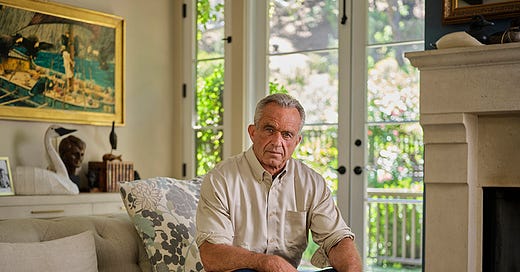RFK Jr. and the Populist Wave

Robert F. Kennedy Jr. at his home in Los Angeles. (Philip Cheung for The Free Press)
Why are Kennedy and Marianne Williamson polling so highly against Biden? Says one Democratic backer: ‘There’s a reckoning coming.’
794
The last time an American president faced a serious primary challenge, the Soviet Union still existed, Roseanne was the No. 1 sitcom in the country, and Mark Zuckerberg was seven years old.
That was December 1991, when right-wing populist Pat Buchanan launched his bid to wrest the GOP nomination from President George H. W. Bush.
Buchanan didn’t get far, b…
Enjoying the story?
Enter your email to read this article and receive our daily newsletter.
Already have an account?
Sign In




